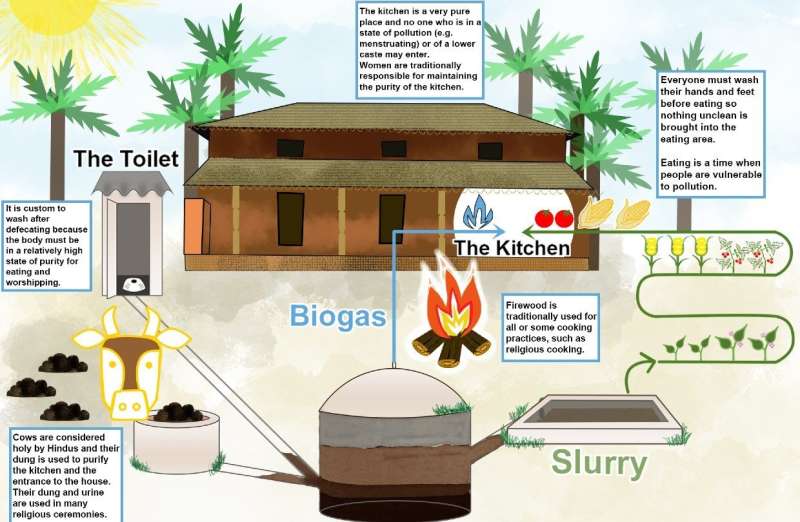The loo taboo: New study explores uptake of domestic toilet waste technologies
Researchers have provided an important insight into the cultural taboo surrounding an innovative ‘green’ technology that enables users to transform their domestic toilet waste into biogas.
The team at the University of Stirling believe that their findings—part of a larger study—will help decision-makers understand and overcome the barriers preventing uptake of new technologies designed to reduce impact on the natural environment.
One pioneering process enables home toilets to be connected to an anaerobic digester—airless units in which bacteria breaks down organic matter—which converts the waste into biogas for use as a clean cooking fuel, and fertilizer to improve soils. However, despite its efficiency, recycling human waste in this way is uncommon because most cultures consider it unsavory.
Social factors influence uptake of technology
Multidisciplinary researchers from Stirling conducted in-depth interviews in Nepal, where uptake of toilet-linked anaerobic digesters (TLAD) is high, to understand how people overcame their cultural aversion. Those who adopted TLAD improved their home sanitation, indoor air quality and use of resources, the study found.
Natalie Boyd Williams, a Ph.D. researcher in the division of Biological and Environmental Sciences, said: “I believe we have all the technology and the means to solve the world’s problems, but whether we are using it or not often depends on social factors.
“Particularly in the West, decision-makers often make assumptions about what people will or won’t accept—meaning that they don’t properly explore how certain technologies can be adopted. There has been community resistance to wind farms and biogas plants, for example, that has been dismissed and overlooked by developers, when engagement with these communities can in fact lead to acceptance.
“We wanted to challenge the assumption by exploring how an initially unacceptable technology—in this case, toilet-linked anaerobic digesters in Nepal—can become widely adopted. This is understood in Nepal but less so outside it.”
Pathways to adoption
The researchers conducted in-depth interviews with rural householders about how they overcame their cultural and religious objections around purity and pollution.

Ms Boyd Williams said: “We found that uptake was high where there was one risk taker who led the way. For example, in one village, one former policeman, who said he didn’t care what people thought, adopted the unit—and within a year most of the villagers had their own.
“This also happened because people could go into his house to see how it worked. Demonstration was another important pathway to adoption, so people could see and understand how it functioned.
“Being able to see and understand the benefits was also very important. People were worried it would make their home smell, or be unhygienic, but they were able to see that wasn’t the case. The benefits began to outweigh their opposition.”
Explaining the benefits of uptake of TLAD, she continued: “Biogas is a clean cooking fuel compared to traditional wood fuel, which blackens utensils and causes indoor air pollution and related illnesses. Liquefied petroleum gas, another common fuel, relies on fossil fuels. The closed, circular system of TLAD improved sanitation and provided fertilizer for crops.
“Lastly, adoption can take time—some had to wait for the older generation to die to adopt it. Policymakers and organizations should be prepared to demonstrate the technology, show the benefits, and be prepared for people taking time to get used to new technologies that they find challenging.”
Potential of small-scale biogas units in the global north
In the UK, sewage and food waste is converted into biogas and agricultural fertilizer using anaerobic digestion on an industrial scale—but smaller scale biogas units remain futuristic, despite their potential contribution to the circular economy.
“I’ve seen potential plans for blocks of flats that have underground shared biogas units,” said Ms Boyd Williams. “And smaller scale biogas units could be used locally across the UK, for instance for community energy projects, like those which the UK government had greater support for in the past. But, at the moment, there are policy barriers to digesters here.
“In the Global South, governments are looking at domestic digester units because they offer good sanitation and indoor air pollution reduction opportunities. If we, in the West, are serious about developing the circular economy, and adopting sustainable technologies, we need to understand what matters to people, how they interpret messages about science, and how and why they change their views and behavior.”
The research was carried out with Durham University as part of an IAPETUS Doctoral Training Partnership, funded by the Natural Environment Research Council. The paper “Taboos, toilets and biogas: Socio-technical pathways to acceptance of a sustainable household technology’ is published in Energy Research and Social Science.
We could power households from the scraps in our food waste bins, so what’s stopping us
Natalie Boyd Williams et al, Taboos, toilets and biogas: Socio-technical pathways to acceptance of a sustainable household technology, Energy Research & Social Science (2021). DOI: 10.1016/j.erss.2021.102448
Citation:
The loo taboo: New study explores uptake of domestic toilet waste technologies (2022, January 12)
retrieved 12 January 2022
from https://techxplore.com/news/2022-01-loo-taboo-explores-uptake-domestic.html
This document is subject to copyright. Apart from any fair dealing for the purpose of private study or research, no
part may be reproduced without the written permission. The content is provided for information purposes only.
For all the latest Technology News Click Here
For the latest news and updates, follow us on Google News.
